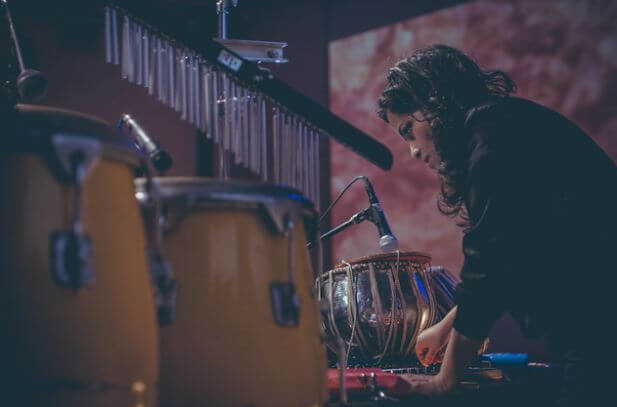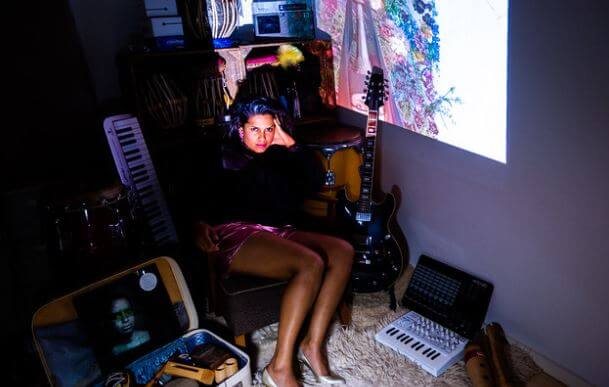 The music of percussionist, composer, producer and multi-instrumentalist RENU (Renu Hossain) is a tour de force of experimentation from a maestro craftswoman informed by decades of practice and study by way of the Queer British Asian experience. RENU’s work is skillfully textured and sonically varied with each new addition to the oeuvre a pleasant surprise and an unexpected yet exhilarating turn into a chasm of cosmic creativity. The latest single ‘Tum obhoi (You are fearless)’ looks to the past in a bold and defiant leap into the future.
The music of percussionist, composer, producer and multi-instrumentalist RENU (Renu Hossain) is a tour de force of experimentation from a maestro craftswoman informed by decades of practice and study by way of the Queer British Asian experience. RENU’s work is skillfully textured and sonically varied with each new addition to the oeuvre a pleasant surprise and an unexpected yet exhilarating turn into a chasm of cosmic creativity. The latest single ‘Tum obhoi (You are fearless)’ looks to the past in a bold and defiant leap into the future.
2021 marks 50 years of independence for Bangladesh. 2021 also marks 21 years of RENU who began her musical journey in the year 2000. RENU cut her teeth as a percussionist for the likes of Grace Jones, State of Bengal and other major artists. RENU’s message, is somewhat different to male identifying electronic artists — It is Femme, it is Queer, it is POC & it is electronica that is like water — you never know what form it will take on.
As a child RENU attended Bengali Sunday school and was encouraged to get into Indian Classical music by her mother. RENU picked up the Tabla at a young age but it was in her later life that she rediscovered it playing it as part of live percussion for Asian Underground outfits such as State of Bengal, Fun Da Mental and Charged.
RENU studies the Tabla and is the disciple of Sri Chiranjit Mukherjee in the traditional ‘Guru shisha parampara’ or Master Student Journey’ method. Her quest for mastery of the instrument and other percussive instruments (Cajon & Latin percussion) has also led her to traverse the world and study under masters based in India, Cuba, Brazil & Spain. RENU has also performed as a percussionist for major Contemporary Dance institutes as well as alongside contemporary and classical orchestras, for example Chineke! Orchestra (Europe’s first majority Black and ethnically diverse orchestra). Her work therefore transcends conventional categorisations of Pop, Dance, Electronic and the Orchestral. Her fierce commitment to experimentation based on a position of study & practice has lead to some of the most sonically exciting and principally innovative tracks this writer has heard this century.
RENU released her first self-produced album Love from London in 2010, it was a move away from percussion and was RENU’s exploration of being a Musical director, arranger, guitarist and songwriter. The album featured a nine piece band including an opera singer and harpist. The blend of theatrics with live music came from RENU’s club nights, specifically the Holykuti Records Night at Jamboree, London. These nights often featured opera singers as well as poets, dancers and performers. The album was followed in 2011 by the London Revellers EP that continued with same themes. 2012 saw the release of Midnight Radio which explored RENU’s South American influences.
Bollywood soundtrack music also had an influence on Midnight Radio, especially the music from RD Burman. Like many second generation British Asians, RENU was exposed to Bollywood in her childhood and was specifically fond of the Burman produced song Mehbooba Mehbooba from the 1975 film Sholay. Watching Sholay is a rite of passage for British Asians, like many Bollywood films being passed down from parents to children. A testament to this is the amount of times that Mehbooba Mehbooba has been sampled, remixed and covered by many Asian Underground and Bhangra artists. It is also a staple for British Asian Bollywood singers.
RENU’s father passed away in in 2012 leading to a pause in RENU’s practice and output and a creative block.
The EP & album Threshold and Plasma were released in 2014 and 2016 respectively and were RENU’s first dips into electronic music and as opposed to her previous albums, these two featured no external musicians. In isolation RENU explored her percussion on a much deeper level and worked with Logic Pro. Both EP & album were commissioned for dance performances and RENU would revisit this world in later years. Threshold was ultimately based on Christian cosmology and spiritualism, and these themes would resurface in the follow up album They Dance in the Dark.
RENU relocated to Berlin in 2015 and much like Bowie who recorded in the Berlin between 1977 and 1979, things took a more electronic turn. RENU discovered Ableton and released They Dance in the Dark in late 2017. They Dance in the Dark received great critical acclaim (BBC Radio 6, BBC Late Junction, The Quietus, Art Forum Magazine) with critics making comparisons to The Orb, Massive Attack and Daphne Oram, as well as lauding the more intricate and delicate sound which one does not normally associate with “Dance Music”.
The album was about marginalized communities, the term “They” with its political overtones was a deliberate choice by RENU, however in a 2017 interview RENU stated that this album was more poetical than hyper political. It was about dancing in the dark and being untrammeled. The influence of House music was also a conscious decision and this was also thematically significant with the Queer POC origins of House music that nowadays, is getting a wider acknowledgement in the music press.

RENU was also influenced by 70s Disco (Which was originally produced on analogue mixing desks.) and wanted that sort of sound for the album, so she hired Guy Sternberg from Berlin to mix and master the album. Sternberg had a less aggressive and more velvety style of mixing which RENU sought in order to make the album sound more difficult to place, in terms of ‘which age’ it was produced.
The track Badr featured an Islamic song known as a Nasheed which had previously only ever been used in a World Music context, RENU wanted to use it in an electronic context. This ethos would inform RENU’s later work as well as a more knowledgeable and respectful use of non-western elements and instruments than what is normally given to them when used in western music. RENU would later comment on the shallow misuse of the term ‘Baul’ in western music.
RENU’s next album The Happening in 2020 tackled the corona virus pandemic head on. The third track Mary somewhat hauntingly ends with the sound of breathing and a cardiac monitor, reminiscent of the heartbeat drums from the track Lay Low from They Dance in the Dark. 2020 also marked the start of a flourishing in RENU’s creative output, composing for choreography and soundtracking an exhibition commissioned by Haus der Kulturen Welt, Berlin on the Rani Ghumpa caves in India.
It was during her recent travels in India that RENU heard about the resurgence of Fakirs, a collective term for many spiritual traditions. The Fakir’s originate from Bengal and adhere to Nadia, “A philosophical premise” which is also the historical regional name of the area that the Fakirs are from. The philosophy is “…articulated through powerful poetry, music and theatrical performances privileging orality over literacy.” The Fakir’s from Nadia fused elements from the Hindu Bhakti (loving devotional worship) movement with elements from Islamic spiritualism. The specific Bhakti movement that the Fakirs claim descent from originated in the 15th-16th century and was known for being “Anti-caste, anti-patriarchal and anti class” and this has some resonance in RENU’s own music and ethos. The Bengali tradition of Baul which refers to “…ritual singers and wanderers.” often gets conflated with Fakirs. It is worth stating that Baul and Fakir are two distinct philosophical/religious traditions comprising many beliefs and that these are spiritual movements and not just the names for music genres as is sometimes understood in the west.
May 2021 saw RENU commence a series of experimental singles with ‘Stutterstep’, a track inspired by the BLM movement that gained prominence last year in the aftermath of the George Floyd killing
‘You are fearless’ (Tumi obhoi / তুমি অভয়) is RENU’s latest release (due 15th November) and features Pagla Baul who is a disciple of Lalon Fakir Shah (1774–1890) whose shrine is in Nadia (Specifically in Kushtia in Present day Bangladesh. (https://en.wikipedia.org/wiki/Lalon).
The track is a spiritual tour de force and stands boldly over the many Baul and Fakir inspired tracks that have plagued the world in recent years. The vocals are haunting yet omnipotent with distorted effects that are powerful yet reassuring like being in the presence of a deity. The balance of force and delicacy which has become a hallmark of RENU’s work is played expertly here and in this writers opinion, this track is RENU’s most accomplished and experimental work to date. It takes inspiration from the affirmative cosmology of Sun Ra but is hotwired for the south Asian diaspora. RENU describes Tum obhoi as a Baul/Fakir speaking to us from the future/space. The track and its follow up singles are inspired by the experimental and fusion work of Alice Coltrane and the broad modus operandi of the Afro Futurist movement and whilst these have been present in RENU’s previous work, they come to the forefront with vehemence here.
RENU hopes to collate this track and the whole series of singles on an EP based upon the Asian diaspora experience.
2022 also brings in a new major album release.
‘You are fearless’ (Tumi obhoi / তুমি অভয়) will be released on 15th November. All proceeds of the single will go to Pagla Baul as the Covid crisis has severely affected musicians in Bangladesh.
RENU’s official website — https://renumusic.me/
https://www.instagram.com/renumusic/
Quotations from Farhad Mazhar (Nobopran Andolon) (2015)
DJ ISURU
Latest posts by DJ ISURU (see all)
- REMEMBERING DJ AND ACTIVIST DAVE WATTS — October 31, 2024
- AVA DUVERNAY’S ‘ORIGIN’ IS ULTIMATELY A STORY ABOUT LOVE | INTERVIEW WITH DR SURAJ YENGDE — March 12, 2024
- THE LIFE OF BENJAMIN ZEPHANIAH… THE POET, ACTIVIST AND AUTHOR — December 8, 2023
